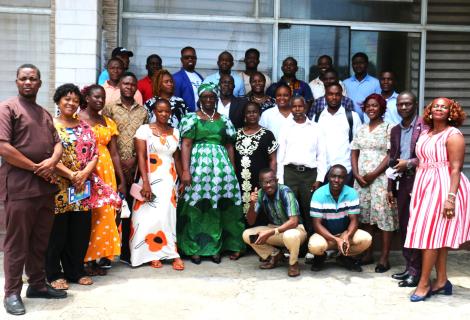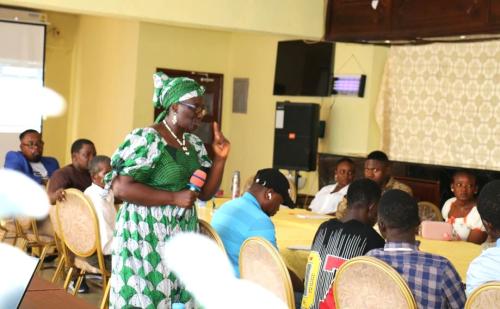ActionAid Liberia Validates CBOs Assessment Report, announces to plans to strengthen CBOs capacity for future grants opportunities

Benefiting over 30 CBOs in Liberia
ActionAid Liberia, with funding from our kind partner Plan International, has concluded a one-day Community Based Organization (CBOs) Assessment Validation Workshop, benefiting over thirty CBOs from across Liberia.
The assessment workshop is part of the Global Fund Resilient and Sustainable System for Health (RSSH) grant implementation that aims at reviewing and validating the findings from the capacity assessment, and proposed capacity-building plans while strengthening the capacity.
According to ActionAid Business Development Manger, Victoria Torlo Koiquah, the workshop comes following a week-long comprehensive capacity assessment and capacity-building initiative for thirty-six CBOs across eight counties in Liberia to assess those organizations existing capacity gaps, followed by the implementation of targeted interventions to address the identified challenges.
The Validation initiative marks a critical step in the process, aimed at also strengthening CBOs roles in support stronger and more robust health care delivery at the local level and across communities Victoria informed attendees by saying.
“We all know that CBOs have played a vital role in the broader health system by providing essential services such as health education when it comes to testing, treatment adherence support, and advocacy, that is why ActionAid Liberia with support for Plan International embarked on this process.”
She continued as reminding CBOs leaders that “The approach is also meant to fosters trust and encourages health-seeking behaviors among populations that may otherwise hesitate to access formal healthcare services due to stigma, discrimination, or fear of punitive measures.”
She then acknowledged that CBOs have served as a bridge between marginalized communities and national health systems, ensuring that these populations' voices are heard in health policy discussions and decision-making processes.
At the workshop, the team validated the capacity assessment findings, and they proposed a range of recommendations that would subsequently inform the next steps and course of actions under the activities to ensuring that these organizations activities and program align with their organizational needs and priorities.
“The selected CBOs will be empowered to respond more effectively to health and other community programs in their communities,” Madam Koiquah said.
Presenting the findings from the assessment Madam Koiquo said the assessment report revealed that 100 percent of CSOs are legally registered as local organizations; 83 percent or 24 of them have Human Resource (HR) policies, and all of the CSOs missions are aligned with the fight against HIV/AIDS, TB and Malaria, while 100 percent of them have board structure.

For his part, Liberia Coordinating Mechanism (LCM) Executive Director, Gabriel C. Stans, in a remark said the capacity-building assessment is an initiative that the LCM, have advocated for in order to build the capacity of the CSOs to being them to date so that they can begin applying for bigger grants opportunity without allowing international NGOs alone to apply.
Stans further state that the training is intended to fully equipped the CSOs with the necessary knowledge and skills, in preparing them to take over the sector in the future when the international depart the country.
“What we are doing with you is to do things differently, but giving you the necessary skills and stool where you can be able to apply for bigger opportunities that yourselves hand handle grants and implement them successfully without looking out to international NGO and so that you the CBOs can be able to take over.”
He added that by saying “By the grace of God, we have succeeded in this advocacy, and the Global fund have allotted some funding for the capacity-building of about 35 CSO.”
The assessment validation workshop also saw Actionaid Liberia former country director, Ernest K. Gaie in attendance. In his remarks, he said the knowledge and skills that CSOs will acquired from the day-long engagement, will be very important in building and strengthening the capacity of their respective organization.
“A lot of you have realized that international organizations are now looking more into the local content therefore, you will have to step up and start performing some of the works, and
responsibilities that ActionAid, and some of the other international organizations have performed,” Gaie said.
“Money will come, but first you have to put your best forth and have a product that you market.”
Through the partnership with CBOs, the Global Fund is committed to fostering an inclusive approach to health service delivery that prioritizes the need of key and vulnerable populations (KVPs).
This commitment aligns with the Global Fund’s broader mission to ensure that everyone, regardless of their circumstances, has access to high-quality health services.